|
|
|
Sort Order |
|
|
|
Items / Page
|
|
|
|
|
|
|
| Srl | Item |
| 1 |
ID:
157553


|
|
|
|
|
| Summary/Abstract |
What factors generate financial fragility in open economies? Existing research assumes that the development of these conditions is more likely to emerge under some configurations of domestic economic and political attributes. We examine the development of financial fragility through the ontological lens of the new interdependence approach, which assumes that global factors can be as important as local factors in generating outcomes. We analyze global financial conditions from 1978 to 2009 and argue that contemporary global finance is an oscillating system that generates boom and bust capital flow cycles. The phases of this cycle are a consequence of the scale of US net borrowing on global markets: when the United States is a large net importer of foreign capital, other economies struggle to attract foreign capital and are substantially less likely to develop fragile financial positions; when US net capital imports fall, other economies receive an abundance of foreign capital, and financial fragility becomes more likely. In contrast, we find little evidence that cross-national variation in political institutions or financial systems explains why fragility develops, although some regional interdependencies are evident. We conclude that global conditions drive the probability of crises occurring someplace in the system, while local outcomes appear to be idiosyncratic.
|
|
|
|
|
|
|
|
|
|
|
|
|
|
|
|
| 2 |
ID:
157551
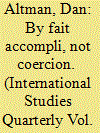

|
|
|
|
|
| Summary/Abstract |
In February 2014, Russia decided to wrest the Crimean Peninsula from Ukraine. Moscow could have threatened to attack Ukraine if Kiev failed to relinquish Crimea. However, Russia did not attempt coercion. Russia unilaterally occupied and annexed the territory, gambling that it could take Crimea without provoking war. This alternative strategy—the fait accompli—receives little scholarly attention. At issue is a fundamental question of statecraft in international politics: How do states make gains? By coercion or by fait accompli? Territorial acquisitions offer the best single-issue domain within which to address this question. Using new data on all “land grabs” since 1918, this research note documents a stark discrepancy. From 1918 to 2016, 112 land grabs seized territory by fait accompli. In that same span, only thirteen publicly declared coercive threats elicited cessions of territory. This fact suggests that the fait accompli deserves a larger role in the field's thinking about strategy and statecraft on the brink of war. It carries with it important implications for canonical theories of war that rely on assumptions about coercive bargaining during crises.
|
|
|
|
|
|
|
|
|
|
|
|
|
|
|
|
| 3 |
ID:
157550
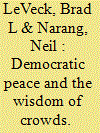

|
|
|
|
|
| Summary/Abstract |
This article proposes a new theory for the democratic peace that highlights a previously unexplored advantage enjoyed by democracies in crises. We argue that because democracies typically include a larger number of decision-makers in the foreign policy process, they will produce fewer decision-making errors in situations of crisis bargaining. Thus, bargaining among larger groups of diverse decision-makers will fail less often. In order to test our hypothesis, we use data from experiments in which subjects engage in ultimatum bargaining games. We compare the performance of individuals, small groups and foreign policy experts against the performance of larger groups of decision-makers. We find strong support for the idea that collective decision-making among larger groups of decision-makers decreases the likelihood of bargaining failure.
|
|
|
|
|
|
|
|
|
|
|
|
|
|
|
|
| 4 |
ID:
157552
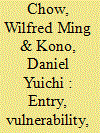

|
|
|
|
|
| Summary/Abstract |
Why are some autocracies more open to trade than others? And why are autocratic trade policies so volatile? Despite wide variation in how autocracies approach international trade, existing research offers few answers to these questions. We argue that the trade policies of autocratic regimes depend in part on the mode of entry of their leaders. Autocrats can enter power either legally—according to established rules of succession—or extralegally, through a palace revolt or coup. These different modes of entry lead to different posttransition politics and trade policies. Because new extralegal leaders are outsiders with limited resources, they are vulnerable to coups by other ruling elites. They reduce this vulnerability by building public support via lower tariffs. However, as they consolidate their rule, they reverse these initial tariff cuts. Extralegal entries thus lead to foreign economic policies that are more “cooperative” in the short run but more volatile in the long run.
|
|
|
|
|
|
|
|
|
|
|
|
|
|
|
|
| 5 |
ID:
157547
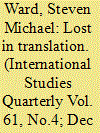

|
|
|
|
|
| Summary/Abstract |
Chinese and Russian foreign policy, in part, reflects both countries’ ambitions for higher status in the international system. This implies a critical question: can accommodating these ambitions prevent, or even reverse, the turn toward geopolitically competitive grand strategies by Moscow and Beijing? In other words, might accommodation lead them to channel their efforts in more benign directions? The dominant framework for analyzing the ways in which states seek status—a framework rooted in the insights of Social Identity Theory (SIT)—suggests that the answer is yes: status-seekers will most likely turn toward geopolitically competitive strategies when they face apparently “impermeable” obstacles to their ambitions. I argue that this framework depends on a “mistranslation” of SIT. Properly translated, the theory tells us little about the consequences of persistent status denial for international politics. Instead, it implies that status-seeking will resolve into geopolitical competition when, first, participants view geopolitically significant resources as markers of status and, second, when leaders believe that they can successfully change the distribution of status. I use analyses of two prominent cases that should prove friendly ground for the conventional translation of SIT—Germany before World War I and Imperial Japan—to demonstrate the serious problems that plague the framework favored by international relations scholars, especially with respect to its central claim about the link between persistent status denial and geopolitical competition.
|
|
|
|
|
|
|
|
|
|
|
|
|
|
|
|
| 6 |
ID:
157543


|
|
|
|
|
| Summary/Abstract |
How are global norms translated into local contexts? I examine the translation of three rule-of-law norms in postconflict Guatemala: the UN Convention on the Rights of the Child, the right to access public information, and best practices for international rule-of-law commissions. These cases, I argue, do not fit established models for diffusion, such as those associated with standard bargaining approaches, norm socialization frameworks, and norm localization theory. Instead, rule-of-law promotion triggered domestic contestation and, subsequently, what I term an “interactive translation loop.” These processes changed the modes of interaction among rule-of-law promoters and how the norms ultimately translated into the Guatemalan context. I demonstrate that a critical variable, the precision of international norms, conditions the leeway available for such translations. To the extent that my framework travels to other cases, it offers an important corrective to established theories of how global norms translate into local contexts.
|
|
|
|
|
|
|
|
|
|
|
|
|
|
|
|
| 7 |
ID:
157548


|
|
|
|
|
| Summary/Abstract |
Does nationalism make interstate conflict more likely? Many believe so, arguing that it led to conflicts such as the Spanish-American War, the two World Wars, and Russia’s recent intervention in the Ukraine. However, others contend that strategic constraints greatly limit the effects of nationalism on state behavior. Resolving this debate has proven difficult because of endogeneity and measurement issues. I overcome these problems by analyzing one of the most powerful sources of nationalism in the modern era—international sports. I first investigate several cases in which surges of nationalism from sporting events led to military or political conflict between countries. I then analyze a regression discontinuity created by the format of the World Cup qualification process from 1958 to 2010. The results provide strong evidence that World Cup nationalism increases state aggression, especially for countries where association football (soccer) is the most popular sport. I also explore a case from the dataset—Senegal in 2002—to illustrate how World Cup nationalism led to a specific dispute in my sample.
|
|
|
|
|
|
|
|
|
|
|
|
|
|
|
|
| 8 |
ID:
157544


|
|
|
|
|
| Summary/Abstract |
Why do states intentionally and publicly violate international norms, even when they anticipate (social or material) costs for doing so? Unfortunately, constructivist scholarship on norm-dynamics lacks a well-developed account of deliberate and open norm transgressions. This gap in the literature has led to a limited understanding of resistance to international norms. Constructivist scholarship on norm-dynamics often treats compliance as an inherent “good” that all states move toward. However, I argue that public acts of norm noncompliance can serve important social functions and are strategically performed by states in pursuit of specific (social or material) ends. I demonstrate that states will overtly and self-consciously violate international norms to either assert their identity as insiders or outsiders in international society or to contest those categories altogether. Drawing on work in sociology and the social psychology of deviance, I develop the concept of norm transgressions to capture intentional and purposeful violations of international norms. I present a typology of norm transgressions (rejective, adaptive, inclusionary, and exclusionary) to provide the groundwork for future scholarship on overt resistance to international norms. The concept of norm transgression bears important implications for our understanding of deviancy, institutional compliance, and normative change in international politics.
|
|
|
|
|
|
|
|
|
|
|
|
|
|
|
|
| 9 |
ID:
157549


|
|
|
|
|
| Summary/Abstract |
Does a shock to the balance of power cause the advantaged actor to exploit its newfound advantage by initiating conflict? The modeling literature on commitment problems as a source of war makes a central assumption that states know and anticipate power shifts. We relax this assumption such that states must estimate future power shifts by looking at past and present capabilities—both their own and those of their adversaries. We incorporate these estimates, and their attendant uncertainty, into a model of war. We find that commitment problems remain a source of war, but that the existing models overpredict war by ignoring this dynamic. States continuously updating their estimates and accounting for uncertainty promotes peace. It follows that the apparent window of opportunity—in which the power balance becomes suddenly favorable to one side—poses less of a threat to peace than previous theories suggest. This result has applications to nuclear proliferation dynamics and conflict in general. We find empirical support for the model in tests analyzing power shifts and interstate wars.
|
|
|
|
|
|
|
|
|
|
|
|
|
|
|
|
| 10 |
ID:
157554


|
|
|
|
|
| Summary/Abstract |
Nineteenth-century Latin America saw more extensive innovative thought about international political economy than generally recognized. Far from simply imitating British free-trade doctrine, Latin Americans from that era actively modified it to produce distinctive revolutionary, conservative, and developmental rationales for free trade. Opponents of free trade also generated three varieties of Latin American protectionist thought—developmental protectionism, artisan political economy, and autarchic protectionism—that foreshadowed some aspects of post-1945 Latin American structuralist and dependency thought. These various ideational innovations involved both of dominant British free-trade doctrine as well as adaptation of alternative ideas diffusing from elsewhere (a process that we call alternative localization). They reveal new dimensions of the intellectual agency of actors in peripheral regions in the context of the international diffusion of ideas. They also highlight underappreciated diversity within, and overlap between, the historical international political economy (IPE) schools of economic liberalism and economic nationalism. More generally, recognition of these Latin American contributions helps to widen the historical foundations of IPE in ways that are more inclusive of the voices, experiences, knowledge claims, and contributions of those beyond the core powers.
|
|
|
|
|
|
|
|
|
|
|
|
|
|
|
|
| 11 |
ID:
157545


|
|
|
|
|
| Summary/Abstract |
How do countries that share cross-border rivers respond to periods of abnormally low water availability? Existing research concerning water scarcity focuses on how cross-basin differences in absolute availability influence relations between countries. I argue that understanding whether countries react cooperatively or conflictually to within-basin shortages is important. I use the case of two major cross-boundary rivers in the Aral Sea basin of Central Asia to study the effects of within-basin relative scarcity. Employing original data on interactions among the Central Asian countries over the issue of water management, I find an association between, on the one hand, relative water scarcity and, on the other hand, an increased likelihood of both cooperative and conflictual interactions. By showing that relative scarcity affects when cooperative and conflictual events occur, my analysis highlights the fact that absolute scarcity is not the only type of water scarcity that influences international relations on cross-boundary rivers.
|
|
|
|
|
|
|
|
|
|
|
|
|
|
|
|
| 12 |
ID:
157546


|
|
|
|
|
| Summary/Abstract |
Climate change moved rapidly up the international political agenda between 1979 and 1988. What explains this shift? Existing explanations focus on how an international epistemic community built a scientific consensus that informed state interests by reducing uncertainty. However, in 1988 scientists actually heightened uncertainty about the future consequences of climate change by depicting it as a security threat “second only to a global nuclear war.” To account for this, I integrate insights from science and technology studies and securitization theory. In doing so, I theorize how scientists speak the grammar of security and construct existential threats. I argue that scientists catalyzed political action in the climate case by drawing on ideas about time, technology, and humanity's place in the universe. I conduct a discourse analysis of key scientific texts in the 1980s to uncover the frames and discourses scientists used to place climate change on the international political agenda.
|
|
|
|
|
|
|
|
|
|
|
|
|
|
|
|
| 13 |
ID:
157555


|
|
|
|
|
| Summary/Abstract |
Despite the importance of services in international trade and in the support of global production activities, studies of the political economy of trade liberalization tend to focus on goods trade and the preferences of manufacturing firms and their employees. This article advocates greater consideration of service firms and services trade in political economy models of trade policy. I build my argument around a number of stylized facts about US trade in services. The data suggest that the United States maintains a comparative advantage in services trade, which for standard accounts of trade politics would suggest more homogenous support for trade liberalization within the services sector compared with manufacturing. However, the politics of services liberalization are complicated by the distinct and complex features of international trade in services. Tradable services are delivered internationally through cross-border trade (often electronically), but also through temporary travel and—most importantly for US firms—by a commercial presence, that is, foreign direct investment. These features of services trade imply that governments have an array of policy tools at their disposal with which to protect domestic firms from foreign competition. This article documents the relative importance of various modes of US trade in services, assesses the relationship between policy restrictions and services trade, and discusses how growth in services trade may impact firms’ trade policy objectives.
|
|
|
|
|
|
|
|
|
|
|
|
|
|
|
|
| 14 |
ID:
157542


|
|
|
|
|
| Summary/Abstract |
This article studies how transnational advocacy networks can influence international development finance. Transnational activists shaped the World Bank's lending by increasing its transparency and limiting its socioenvironmental impacts. Developing countries can now look toward rising powers’ national development banks to finance their infrastructure and energy projects. The national development banks’ weak transparency and socioenvironmental standards pose a new challenge for transnational activism. Can activists leverage strategies used in World Bank reform to influence emerging power national development banks? We argue that whether a target is a supranational or national institution shapes the deployment and effectiveness of the strategies activists can use for influence. A supranational mandate and structure facilitates the deployment and effectiveness of a direct strategy focused on the transnational level, targeting the bank itself, and an indirect strategy focused on the national contexts of the bank's shareholders and borrowers. In contrast, a national mandate and structure encourages activists to deploy influence strategies solely in the context of the lending state. They furthermore make indirect strategies more effective than direct ones. We illustrate our argument by exploiting variation in the success across campaigns of a transnational network created to reform the Brazilian National Development Bank.
|
|
|
|
|
|
|
|
|
|
|
|
|
|
|
|
| 15 |
ID:
157541
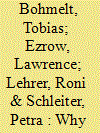

|
|
|
|
|
| Summary/Abstract |
Previous research suggests that political parties learn from and emulate the successful election strategies of governing parties in other countries. But what explains variation in the degree of influence that governing parties have on their foreign counterparts? We argue that clarity of responsibility within government, or the concentration of executive responsibility in the hands of a dominant governing party, allows parties to learn from the most obviously electorally successful incumbents. It therefore enhances the cross-national diffusion of party programs. To test this expectation, we analyze parties’ policy positions in twenty-six established democracies since 1977. Our results indicate that parties disproportionately learn from and emulate dominant, high-clarity foreign incumbents. This finding contributes to a better understanding of the political consequences of government clarity and sheds new light on the heuristics that engender party-policy diffusion by demonstrating that the most visible foreign incumbents, whose platforms have yielded concentrated power in office, influence party politics “at home.”
|
|
|
|
|
|
|
|
|
|
|
|
|
|
|
|
|
|
|
|
|